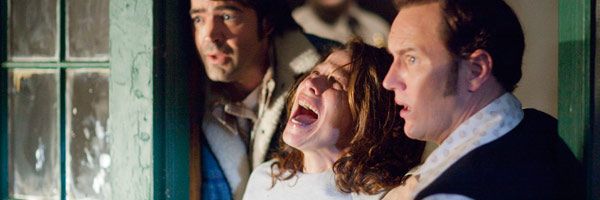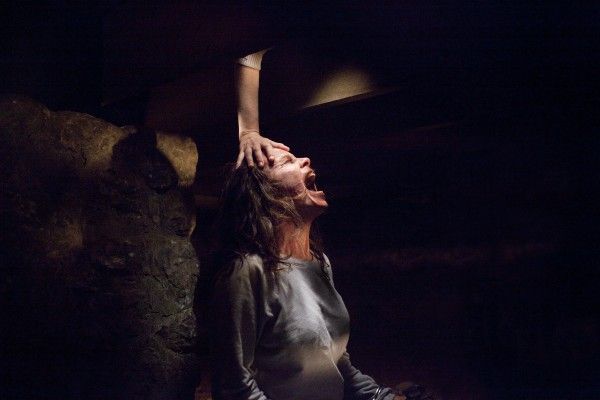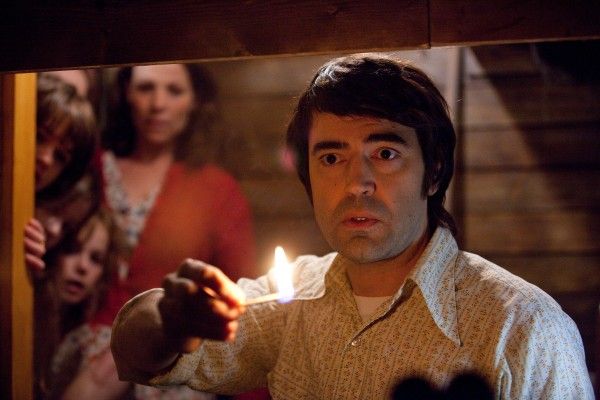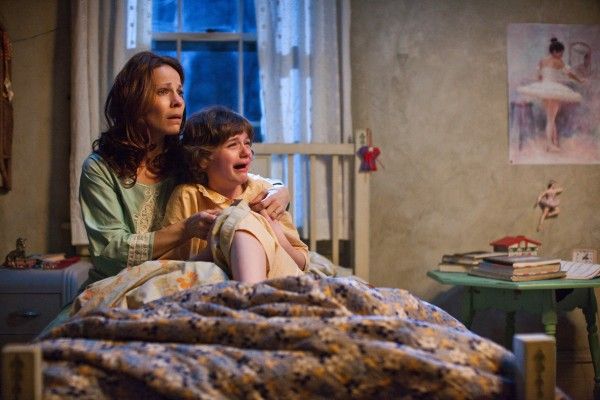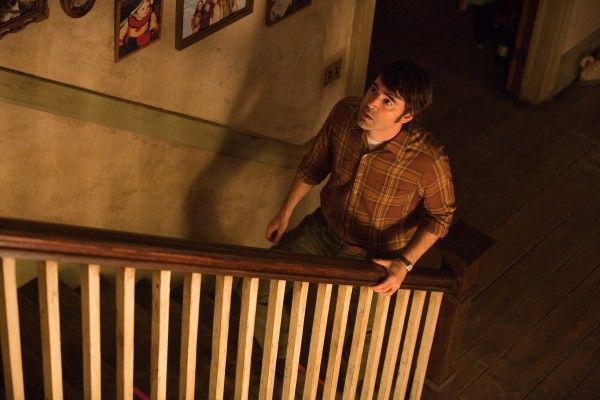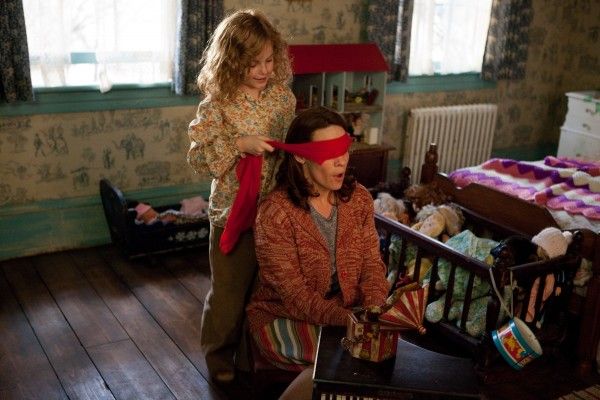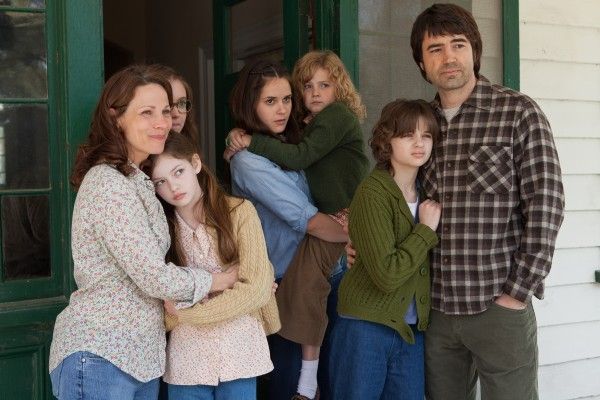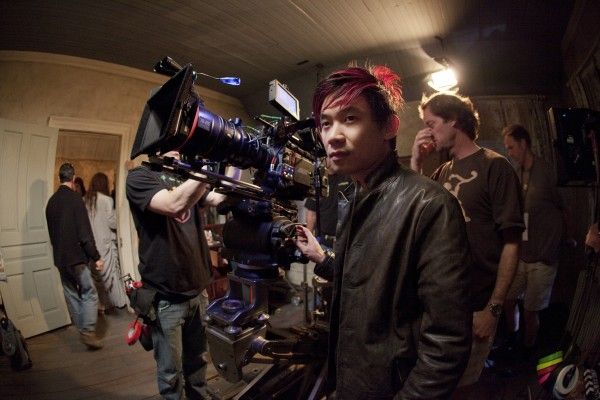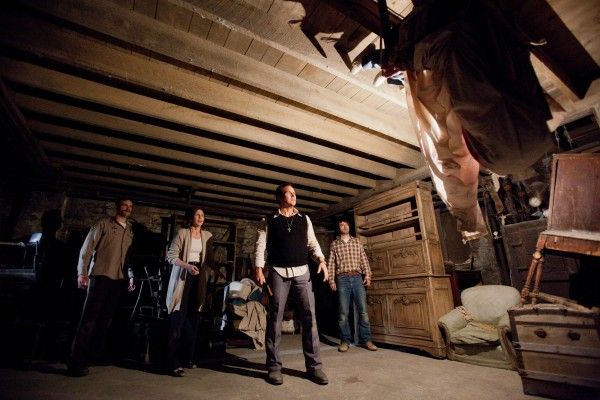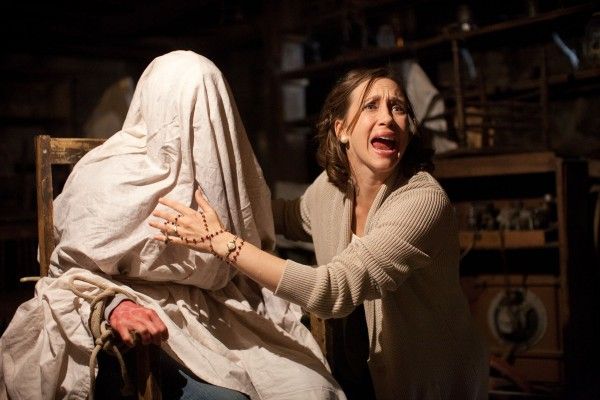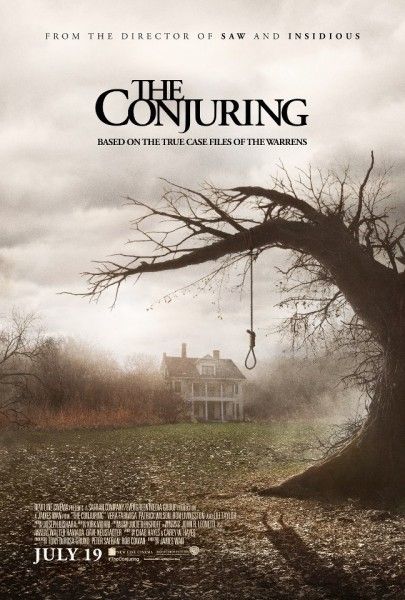Opening this weekend is director James Wan’s (Insidious) horror film The Conjuring. The film is based on the story of the Perron family who inhabited a haunted Rhode Island farmhouse in the 1970s. Lili Taylor and Ron Livingston play the Perrons, and Vera Farmiga and Patrick Wilson play a husband and wife team of psychic investigators who encounter the most horrifying case of their career. I found the movie to be extremely well done and I'd definitely recommend checking it out. For more on the film, watch some clips.
At the recent San Francisco press day, I participated in a roundtable interview with Taylor and Livingston. They talked about making the film, whether anything weird happened on set, working with James Wan, telling a true story, what they collect, and a lot more. Hit the jump for what they had to say.
Question: What were your first reactions to hearing that you were going to be in this sort of movie? A horror film like this? Any trepidation going into this, or excitement?
LILI TAYLOR: I was psyched, because I’d seen Insidious, and I love when horror movies are done well. I love them. I was excited.
RON LIVINGSTON: It’s funny, because your first reaction is like, a horror film? Maybe it’ll actually succeed. The second one was to go watch Insidious and see kind of immediately, when I was watching that movie, that this director [James Wan], that he’s up to something. He’s doing something different. All the little Hitchcock references and what he was doing with the practical effects jumped out. When I heard about the cast, that was like, this is going to be something ambitious.
Did you know that this was based on a true story? Does that up the ante any?
TAYLOR: I think there’s less places to go in my mind, in terms of rationalizations. I think the denials just got more cracks in it. Which is tough. With things like hurting a child, you’re like, “Oh it didn’t... oh, but it did really happen. Oops.” That’s tough, but on the other hand, for us, we just believed it. Whether it’s true or not, we believed it, and the characters believed it.
LIVINGSTON: It doesn’t really change the way you work as an actor, because if the story comes off as bad, nobody cares if it was true. If it comes off good, nobody care that it was fiction. You have to treat the story as if it deserves to be told in a real way, because you’re hoping the audience is going to have a real experience with it. I think where the big difference is going to be that it’s a historically based story is that it takes away that little safety net that an audience sits down with that says this is going to scare me for the next hour and a half, but once the credits roll, I remind myself that this was made up and we can all agree that this was made up. Each individual audience member can still say I don’t believe it’s true, but they don’t have the safety of having said everyone agrees with that. They have to consider who they think is credible.
Were there any crazy little incidents that happened on set while filming that made you take pause?
TAYLOR: It was a totally built house in North Carolina, built set. We had so much to do, we didn’t have time to say, “Hey James, I’m feeling this...” Shut up, we’ve got things to do! We had a lot to do.
LIVINGSTON: Almost the opposite. I think the only thing that was a little paranormal was that it went smoothly and everybody got along and nobody got hurt and the movie turned out well. That’s the one! I’m waiting for the other shoe to drop.
What do you guys think now that other people are seeing the movie? You’re seeing other people’s reactions on Twitter with the hashtag and everything. What do you guys think about the positive reaction that you’re getting?
LIVINGSTON: I was going to knock three times, but I’m not going to do that. I’m really hopefully. Having done this for a while, I know there’s a big step between making a movie, making a movie you actually think is great, and having an audience of people find it when it opens. That’s somebody else’s job, it’s what we’re here doing now, but I know a lot of times that ball gets drop. A lot of movies slide under it. To see it trending up and people talking about it already and it getting out there -- I’m really excited by it.
TAYLOR: This doesn’t really happen a lot. Once, two, three times if you’re lucky, maybe. We work, and I’ll do the best that I can, and work the hardest that I can, and then I have to let it go, and if it happens, great. If it comes back, it’s just nice. We need that stuff to come back every so often, to keep doing what we do.
Going back to the true story aspect, did you guys go back and look at the story of the Perrons?
TAYLOR: No, because I feel the writers and James did everything. The script is what I want to work from. If if bog it down with stuff that not’s in the script, it gets too weighed down. I went with what they came up.
LIVINGSTON: I looked at the first two chapters of Andrew Perron’s book, but really only to get the backstory of where they came from before the events got started. There’s a weird thing that happens, especially in a horror movie, because the audience knows this a horror movie. We’ve seen the poster. We have to come into oblivious to anything that’s happening. I wanted to know as little as possible about the details. I think it’s different if you’re in Patrick’s [Wilson] role or Vera’s [Farmiga] role, where you’re supposed to be an expert on this stuff, and you want to have that. I was supposed to be an anti-expert.
Completely different question. What do you both collect, or completely nerd out for?
TAYLOR: I’m a birder. So I nerd out for birds.
Like all birds?
TAYLOR: Yup. I like to watch birds.
Did the bird scenes freak out?
TAYLOR: Yes, a little bit! I may have to talk to my birder friends. Who was hurt in the making of this? Pigeons? Oh, that’s alright.
LIVINGSTON: I have a short attention span, so I go through short nerd-out phases. Right now I’m stuck on off season Chicago Bears acquisition news. It’s a terrible time of year because nothing’s happening, but I’m still on the website every fifteen minutes.
What was the last thing you nerded out for?
LIVINGSTON: Antique furniture. Arts and crafts, and Art Nouveau stuff.
What is the all time scariest movie for you?
TAYLOR: Probably The Exorcist. I feel this is a close second. He’s up there now.
Same for you?
LIVINGSTON: The Shining, I think. Which is funny, because I went back and watch it again, and it’s a haunted house movie. It comes down to the place, and I’d forgotten about that element.
So you haven’t seen Room 237 yet?
LIVINGSTON: The documentary? Oh no, that’s on my list though.
That’s not a haunted house movie. It’s about us not landing on the moon.
LIVINGSTON: Alright. I’m looking forward to that.
When I got to a horror film, I’m a little bit worried, because I love this kind of film, but I’m always afraid it’s going to get kind of gory. This movie is not gory. Was that an attraction for you? Did you know that when you first signed on?
TAYLOR: I’m also afraid they’re going to show me everything. Do you know what I mean? The CGI thing -- The Conjuring is showing that we like our imagination. We like to work with the movie. We don’t need to see everything. That’s what scares me more than gore, the CGI stuff. Practical effects, it’s the way to go. Let’s see if we can go there. I don’t like the gore either, I know what you mean.
Would that have turned you off from doing this movie, if it was another gory horror movie?
TAYLOR: Depends. I did this thing, The Addiction, small Abel Ferrara movie. A lot of blood, but it was okay.
LIVINGSTON: I did Band of Brothers, which was pretty gory, but in a movie like this, you have a certain visceral reaction when you seen it. It has a shock value. It only works a couple times, and then you start to get inured to it. What happens, is that they keep upping it. We got to bigger, nastier, more blood. It turns a corner at a certain point where it doesn’t bother you at all. You’re like, “Oh, awesome!” That’s the point in a horror movie that I’m not interested in. I’m not interested in the genre where you cease to care about any of the victims and now you’re just in for a perv ride with the bad guy. This, to me, was the opposite of that. It reset the naivety timer on that. It’s the girls, the little kids. You don’t want to see any of them get hurt. You don’t want to see any of them stub a toe.
Or the dog.
LIVINGSTON: Or the dog even.
In connection with your new fall TV show [Almost Human], when did you shoot this? One before the other?
TAYLOR: I think it was last winter. A year ago this winter. Maybe 2012? Would that make sense? Yes.
And then you shot the pilot?
TAYLOR: I shot the pilot this April.
It just seems like such an extreme to go from practical effects, and then to the future with an incredible looking show. It seemed like a real extreme.
TAYLOR: That’s a good point. With sci-fi, I allow CGI more with sci-fi, for some reason. Practical effects, like a little spaceship flying practically, might not work. What I like though, I also feel like it’s a “genre,” but the creative people are pushing the genre to see how far it can go. Emotionally, complexity-wise, and so on. That interests me.
It’s a good series.
TAYLOR: Thank you.
How exhausted were you after the exorcism scene? It looked very physical and emotional.
TAYLOR: It took about seven days, but it was at the end, so thank God. Literally, the last shot was I was in the sheet, and I just slumped over. I just slumped over. I think James wanted me to go one more time, but I was just slumped. Everyone thought that was enough. It’s over! I just chilled out. I was surprised I wasn’t getting more into my rhythm, like two weeks done. Then I was like, “Oh right, right. I was possessed for two months. I’ll give myself a break.” I gave myself a month to just back up to speed.
James has obviously been working in this genre for a while, and you said he’s really good at it. When you’re filming, sometimes directors will have you do a different version of a take, because they’re not sure what they’re looking for. How was he on this? Did he know exactly every scene, how he wanted everything to play out, or some finding on set?
TAYLOR: I feel he knew exactly what he wanted, but he was very flexible. In the moment, if he had to change something, he has enough skills and knowledge to be able to move and be flexible. But he knew. He knew. That’s one reason why I think it’s good. He’s so clear. He sees everything in his mind’s eye.
LIVINGSTON: He’s still got an ability, and I think a lot of times directors, it’s hard to both have the technical expertise and be like I’m seeing the composition, I’m seeing the lighting, I’m seeing the design elements -- I feel like he can then shut that off and go, “How is the audience going to see this?” He doesn’t care about any of those things. What part of the screen are they going to be looking at? What are there eyes going to do? What are they going to be thinking? What’s the timing that I need to surprise them? He kind of still has that. It gets really hard, especially in the editing room. You’ve been with something for so long, you don’t have fresh eyes any more. So you completely forget what it’s going to be like for somebody who hasn’t seen it. I think it’s a really good skill for a director to have. There’s a story on Saving Private Ryan, where [Steven] Spielberg and Tom Hanks were looking at a shot, where somebody’s bleeding out, and there’s a special effects hose laying out spraying the blood out, and they’ve done a bunch of cuts. Hanks is like, “Wow. That’s a powerful, amazing scene. You’re going to CGI that hose out.” Spielberg’s like, “What hose?” Hanks says, “The hose that’s in the middle of the thing.” Spielberg’s like, “Oh, they’re never going to see that.” It’s that sense of come on. You can look at it too much for the details. The idea that he has them both, James has that.
Was it a collaborative process as well?
TAYLOR: Totally. It’s one of the many things that makes him so great, he’s a true collaborator. A lot of great directors, the ones that are great to me, listen and collaborate with their department heads.
LIVINGSTON: He really draws on not only his expertise, but he knows and trusts the fact that he has great people. He’s worked with them before, so he really lets them run. All of his designers and cinematographer. That’s a really important skill as you scale up, because it gets to be too big for one person to do.
What were your first films for each of you?
TAYLOR: Mystic Pizza.
LIVINGSTON: The first film where I had a speaking role was The Low Life, but I did appear for about three seconds in Straight Talk, with Dolly Parton and James Woods. I had a line, and it was cut. It was alright, I got my AEU card anyway.
Originally this was going to come out in January or February and then they did test screenings, and it tested really high, and they moved it to the summer. When did you first find out the film was moving? Where you excited, or were you like, “Shit?”
TAYLOR: I think I found out in the fall, I guess. At first I was like, “Oh.” I had just hired a publicist, getting ready, and then I was like, “Oh, okay.” Take it down, we got to pause. Then I was like, if this going to be it, let’s go then. Let’s put it in the Batman slot then. Let’s go.
LIVINGSTON: I was really excited that they have that much confidence in the film. Now having seen it, and having seen it with an audience, I know why. It is always scary, because you’re at least doubling down to get in there and swing amidst all the summer blockbusters, but hopefully it’s going to be one that pays off.
Were you watching the audience instead of the film?
LIVINGSTON: I hear the audience. This one I was up towards the front, so I didn’t see them, but I heard them.
For both of you guys, you’ve done a lot of stuff in your career. When you’re standing in line somewhere and someone recognizes you, what’s the one thing they always want to talk about? Or two things they want to talk about.
TAYLOR: For me, it’s not usually talking about, it’s usually just a thank you or an acknowledgement, which is really nice. I work, I’ve been working, I love what I do and they acknowledge it, and then we go our own way. I think celebrities who are more like Julia Roberts, I know she might not be as big as she was ten years ago, but she was that kind of celebrity. She had a different thing she was carrying for the public, where it was a lot more projections going on her as opposed to you’re an actor, thanks for you work. Instead, it was I’m projecting all this stuff on you and I want to get it all from you. Kind of take, take, take. I’m glad I don’t have that, because I don’t think I’d carry that as well.
So if this movie blows up big and the paparazzi comes after you, do you think you’ll be able to handle that well? Both of you?
TAYLOR: I feel like I’ve been around. If it blew up, and you try to put that on me, it’s like, you’re still just an actor. As opposed to a star.
LIVINGSTON: It’s not even like I have a YouTube video from my high school talent show or something like that. There’s kind of a new age where everybody has a camera. Everybody is following people around and taking pictures of them and putting it out into the public. It’s not that we worry about that less, it’s that you guys need to worry about that more.
What was your reaction to the recognition question?
LIVINGSTON: It’s very similar. It cycles around. It kind of depends. There was a time when I would get a lot of people who would say my dad is a WW2 vet, and since Band of Brothers, he’s started talking about it. That was a five to ten year span where that was really common. A lot of it is just, “Hey, how you doing? What’s up? Nice to meet you!”
I would say something about Office Space.
LIVINGSTON: They don’t need to talk about it. They’ll say, “Hey, are you that guy? Nice to meet you, I’m John.”
Does it ever get old, with people saying, “How are the TPS reports going?”
LIVINGSTON: That is pretty rare. I think most people try to come up with something. For anyone who had seen something and come up with the trouble to say something, they were all more socially at ease than I was. If anything, I would be the awkward person in that exchange. They’d be like, “Hey man, how you doing?” You know.
For both of you, talk about what you have coming up next.
LIVINGSTON: I’m doing some work on Boardwalk Empire this season. I’ve got a movie coming out called Drinking Buddies, another one Touchy Feely later this year.
I’m going to have to do a follow-up on Boardwalk. That is a fantastic show. Do you play a mobster?
LIVINGSTON: I’m playing a grocery store executive who takes a shine to Gretchen Mol. It’s a little bit of a love interest.
Do you have any scenes with you Office Space costar?
LIVINGSTON: No, I haven’t seen Stephen [Root] on set, but he’s doing amazing work with that accent. That Louisiana accent he’s doing is super cool. Stephen’s a guy I keep seeing him in movies and not knowing he’s him until the credits roll. Who’s that guy? Then the credits roll, and it’s Stephen Root.
Is that a goal as an actor, to morph yourself into that character?
LIVINGSTON: I would love to be able to do that. I don’t think I’ve traditionally been cast in that kind of stuff, but I’d love to have that skill set.

